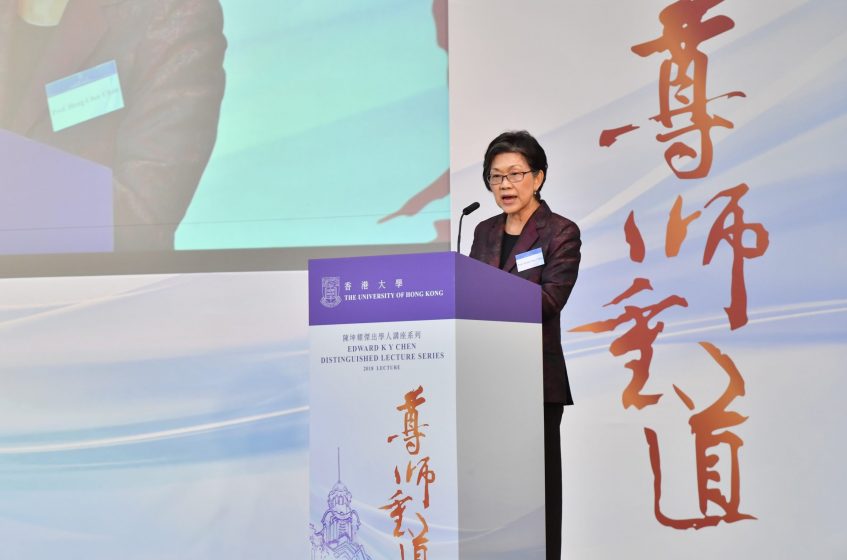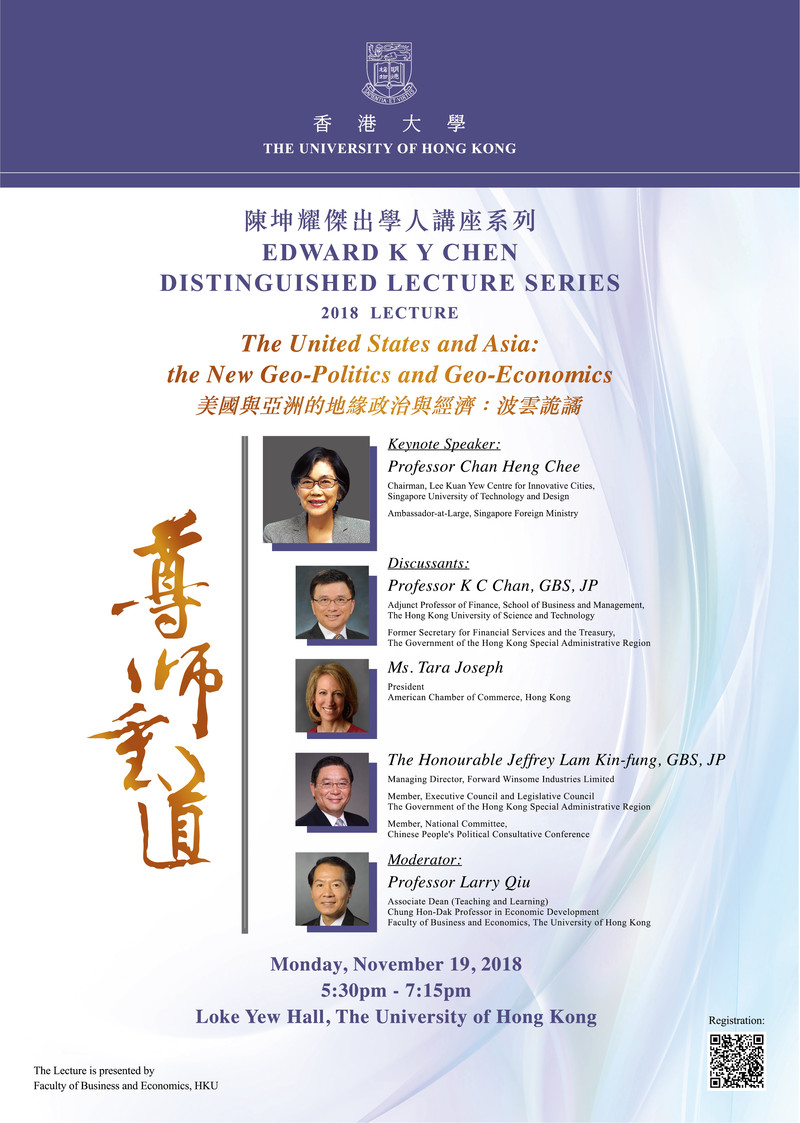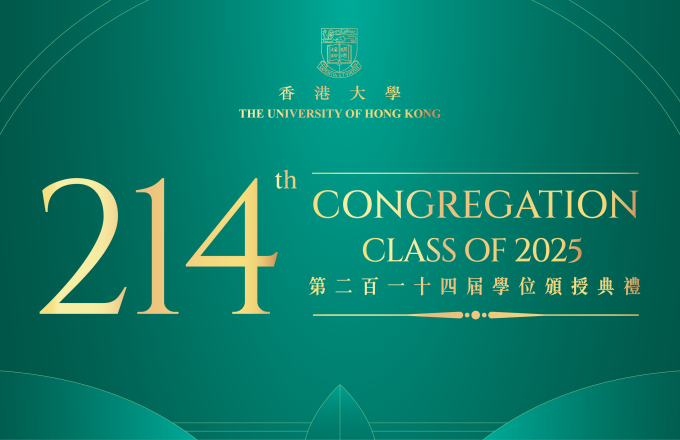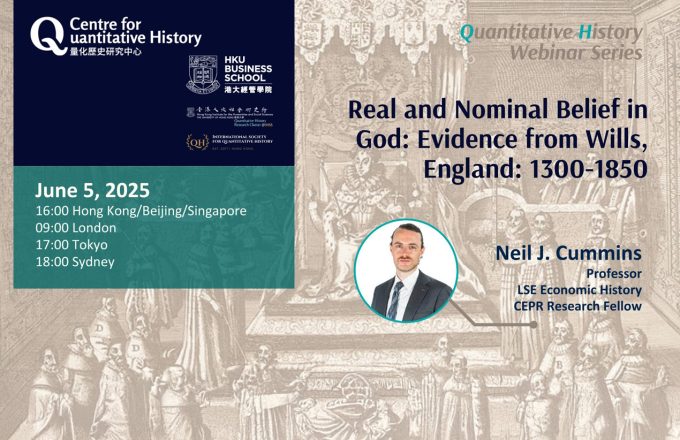
Edward K Y Chen Distinguished Lecture Series 2018

Keynote Speaker
Professor Chan Heng Chee
Chairman, Lee Kuan Yew Centre for Innovative Cities, Singapore University of Technology and Design
Ambassador-at-Large, Singapore's Foreign Ministry
Discussants
Professor K C Chan, GBS, JP
Adjunct Professor of Finance, School of Business and Management, The Hong Kong University of Science and Technology
Former Secretary for Financial Services and the Treasury, The Government Of The Hong Kong Special Administrative Region
Ms. Tara Joseph
President
American Chamber of Commerce, Hong Kong
The Honourable Jeffrey Lam Kin-fung, GBS, JP
Managing Director, Forward Winsome Industries Limited
Member, Executive Council and Legislative Council, The Government of the Hong Kong Special Administrative Region
Member, National Committee of the Chinese People's Political Consultative Conference
Moderator
Professor Larry Qiu
Assistant Dean (Teaching and Learning)
Chung Hon-Dak Professor in Economic Development
Faculty of Business and Economics, The University of Hong Kong
The US has been the predominant power in the Asia Pacific for the last 70 years, establishing and maintaining the regional order during and after the Cold War. Countries in the region have developed and prospered under Pax Americana. China’s rise is a challenge to the existing order. How to engage China is a major issue in US foreign policy. Every administration asks the question, “Is China a strategic competitor, a strategic rival or strategic adversary?”
The election of Donald Trump as President of the US has been a game-changer. President Trump seems to renounce much of established US foreign policy, champions “America First”, and is determined to push back on America’s trade deficits. The US-China relationship is fast deteriorating as the trade war deepens and expands. Will this be a new Cold War? The Trump Administration has not taken issue with any country in ASEAN. Rather it sees ASEAN as a function of the US-China rivalry and wants to keep allies and partners in ASEAN in its orbit. In Northeast Asia, for the first time the unresolvable issue of peace on the Korean Peninsula has an opportunity to move because of the unpredictable nature of President Trump and the unexpected personality of Kim Jong Un. Will this lead to a paradigm shift on the peninsula? The existing regional order will be modified by the actions and policies of new powers. But it is not clear what will emerge to replace it. What does the new geo-politics and geo-economics look like? The lecture will explore this in greater depth.
Welcoming Remarks by Professor Hongbin Cai
Dean, Chair of Finance
Faculty of Business and Economics, The University of Hong Kong
Introduction by Profressor Frederick Si-Hang Ma
Chairman, MTR Corporation Limited
Honorary Professor, Faculty of Business and Economics, The University of Hong Kong
Presentation by Keynote Speaker
Professor Chan Heng Chee
Chairman, Lee Kuan Yew Centre for Innovative Cities, Singapore University of Technology and Design
Ambassador-at-Large, Singapore’s Foreign Ministry
Panel Discussion
Keynote Speaker
Professor Chan Heng Chee
Chairman, Lee Kuan Yew Centre for Innovative Cities, Singapore University of Technology and Design
Ambassador-at-Large, Singapore’s Foreign Ministry
Discussants
Professor K C Chan, GBS, JP
Adjunct Professor of Finance, School of Business and Management, The Hong Kong University of Science and Technology
Former Secretary for Financial Services and the Treasury, The Government of the Hong Kong Special Administrative Region
Ms. Tara Joseph
President, American Chamber of Commerce, Hong Kong
The Honourable Jeffrey Lam Kin-fung, GBS, JP
Managing Director, Forward Winsome Industries Limited
Member, Executive Council and Legislative Council , The Government of the Hong Kong Special Administrative Region
Member, National Committee, Chinese People’s Political Consultative Conference
Moderator
Professor Larry Qiu
Associate Dean (Teaching and Learning)
Chung Hon-Dak Professor in Economic Development
Faculty of Business and Economics, The University of Hong Kong
Question-and-Answer Session
Closing Remarks by Professor Edward K Y Chen







